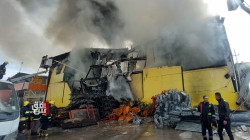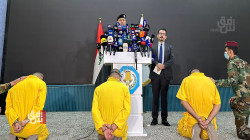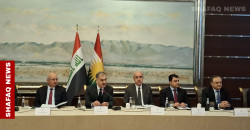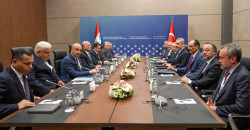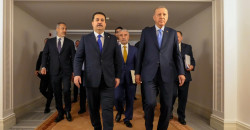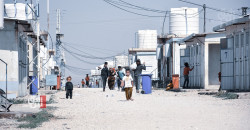Baghdad prepares for anticipated Erdogan visit amidst ongoing violations and thorny PKK file
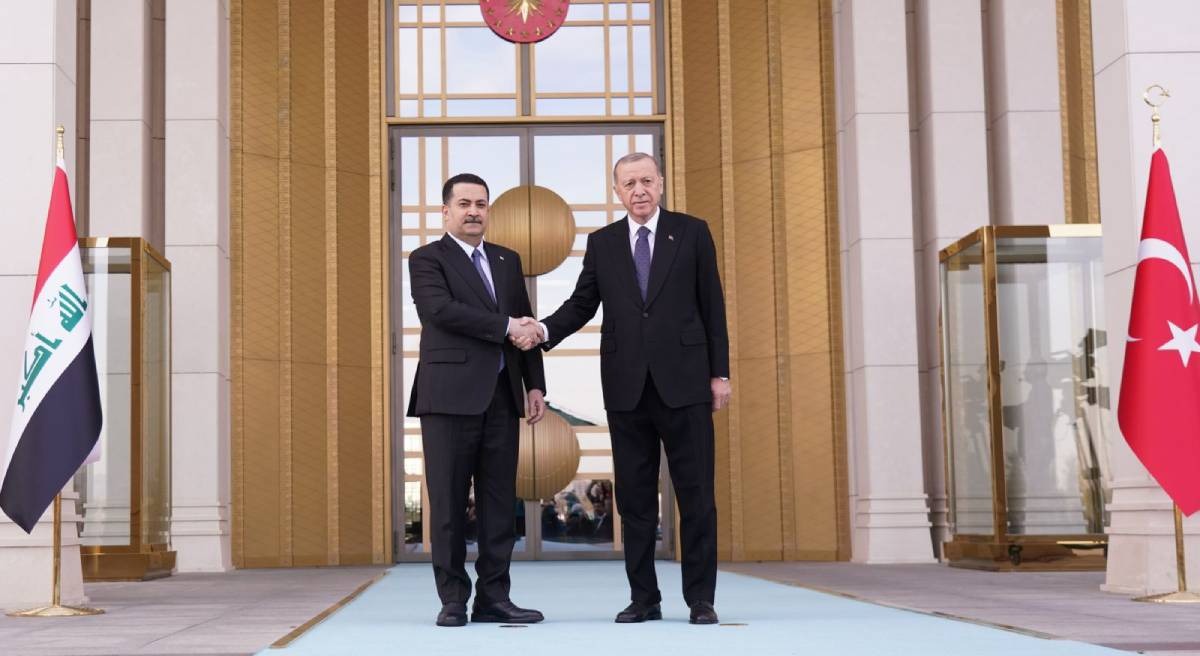
Shafaq News / Turkish President Recep Tayyip Erdogan is slated to visit Iraq this April, with discussions centered around various topics, notably the establishment of a safe zone between Iraq and Turkiye.
Turkish sources have confirmed Erdogan’s visit to Baghdad on April 22, marking his first visit in twelve years.
The visit, actively prepared for in recent weeks, will witness the signing of agreements and memoranda of understanding, including cooperation in counterterrorism efforts.
ERDOGAN’S VISIT
Erdogan’s upcoming visit holds significant importance for both countries, according to a senior Iraqi government official. High-level security meetings held in Baghdad on March 13, involving foreign and defense ministers, intelligence chiefs, and other officials from Turkiye and Iraq, have paved the way for this visit.
Agreements reached during these meetings focus on counterterrorism and bolstering cooperation across various sectors such as trade, agriculture, energy, water, health, and transportation.
The first round of talks occurred on December 19 in Ankara, followed by reciprocal visits of foreign and defense ministers, intelligence officials, and security chiefs from both nations, alongside Turkish officials’ visits to Erbil.
Turkiye plans a wide-ranging military operation to eradicate the presence of the Kurdistan Workers’ Party (PKK) in the Kurdistan Region of Iraq in collaboration with Baghdad. Baghdad’s participation in these efforts is linked to cooperation in energy, water, and transportation issues, along with the Development Road project, which Ankara has welcomed.
Through this operation, Turkiye aims to establish a buffer zone along its southern border, extending 30-40 km into Iraqi territory, to eliminate threats from the PKK and sever its ties with the Kurdish People’s Protection Units (YPG), the main component of the US-backed Syrian Democratic Forces (SDF) in northern Syria, in cooperation with Baghdad.
President Recep Tayyip Erdogan stated in March that the establishment of a security belt will be completed by next summer while continuing measures to finalize the safe zone in northern Syria.
Last month, Turkish Foreign Minister Hakan Fidan announced for the first time the anticipated visit of Erdogan to Iraq, stating that it would take place in April without specifying an exact date, speaking about the formulation of agreements within a specific framework until this visit.
Following his return from Baghdad last month, Fidan stated that the framework agreement being worked on includes regional cooperation, not only in security but also in a wide range of areas, including energy, water, agriculture, and border gate operations.
He pointed out that Iran can also participate in joint development projects between Turkiye and Iraq.
Fidan confirmed that security is one of the pillars of the framework agreement efforts aimed to be signed during Erdogan’s visit, stating that “there will be a memorandum of understanding in this field.”
He mentioned that "there is intelligence cooperation between Iraq and Turkiye, and there are areas of cooperation with Baghdad and Erbil revolving around security and counterterrorism.”
Zeki Akturk, the media and public relations advisor at the Turkish Ministry of Defense, stated last week that Baghdad has shown a positive inclination towards establishing a joint operations center with Turkiye aimed at coordinating operations against the PKK.
Sources in the Turkish Ministry of Defense confirmed that there is an agreement between Ankara and Baghdad to establish a safe zone on the border extending 30 to 40 kilometers into northern Iraq by the summer, as previously announced by President Erdogan.
TURKMEN’S ROLE IN STRENGTHENING RELATIONS
In this regard, the President of the Iraqi Turkmen Front Hassan Turan told Shafaq News Agency that “the visit of the Turkish President is important for the development and improvement of relations between the two countries, and the Turkmen act as a bridge between Baghdad and Ankara to enhance these relations between the two neighbors.”
INTELLIGENCE WAR
Analyst and expert on Iraqi and Turkish affairs, Sabah Mahmoud, told Shafaq News Agency that “there is an intelligence and covert war between Turkiye and the PKK, where Turkiye regularly targets PKK members in Kurdistan, using drones to target their positions.”
He affirmed that "this year, Turkish attacks on PKK sites and targets have increased, with around 14 significant targets of PKK members, including high-ranking leaders, being successfully hit.”
Mahmoud continued, stating that “the PKK has succeeded in recruiting locals in the areas where it operates, especially in Sinjar in Nineveh, and it also has affiliates and supporters in Kirkuk and Diyala. It can move and operate freely, allowing it to target whomever it wishes, striking at any time and place.”
TURKIYE’S VIOLATION OF IRAQ’S SOVEREIGNTY
Kurdish academic Sherzad Khalil told Shafaq News that “Turkish airstrikes on the Kurdistan Region constitute a violation of sovereignty according to the constitution, which obliges Iraq to uphold the peace, sovereignty, and dignity of the country.”
He pointed out that "the constitution stipulates not to use Iraqi territory as a launching pad for attacks on neighboring countries, yet the Iraqi government has not acted per the constitutional and legal texts.”
Regarding the presence of the PKK in Sinjar, Khalil clarified that “the Kurdistan Regional Government has repeatedly demanded the PKK and its affiliates to leave Sinjar and not provide a pretext for Turkish airstrikes. The federal government is responsible for protecting the land and skies of Kurdistan, and according to the constitution, it is obliged not to allow armed groups to launch attacks on neighboring countries, while simultaneously not allowing neighboring countries to attack its territories.”
IRAQ-TURKIYE RELATION OVERVIEW
The two countries share a long border and a rich history. However, their relations have also been marked by periods of conflict.
One of the primary sources of tension between Turkiye and Iraq is the Kurdish issue. Turkiye views the PKK as a terrorist organization and has been conducting cross-border military operations against the PKK in Northern Iraq since the 1980s.
In July 2015, a two-and-a-half-year-long ceasefire broke down, and the conflict between Ankara and militants of the PKK entered one of its deadliest chapters in nearly four decades.
Since that date, the conflict has progressed through several phases. Between roughly 2015 and 2017 the violence devastated communities in some urban centers of Turkiye’s majority-Kurdish southeast and – at times – struck into the heart of the country’s largest metropolitan centers. From 2017 onward, the fighting moved into rural areas of Turkiye’s southeast.
As the Turkish military pushed more militants out of Turkiye, by 2019 the conflict’s concentration shifted to northern Iraq and northern Syria.
The Turkish army has established several military bases at strategic points in the Matin mountain range in Iraqi Kurdistan, citing the expulsion of Kurdistan Workers’ Party militants as justification.
Another source of tension is the issue of water resources. Turkiye controls the headwaters of the Euphrates and Tigris rivers, which are vital to Iraq’s agriculture and economy. Turkiye has been accused of using its water resources to its advantage, harming Iraq’s interests.
In recent years, there have been some positive signs in Turkish-Iraqi relations. The two countries have signed many agreements on trade, energy, and security cooperation. However, there are still some unresolved issues that could strain relations in the future.
Turkiye is also a significant investor in Iraq, and the two countries have a robust economic relationship.
The economic ties between Iraq and Turkiye are multifaceted, spanning various sectors such as energy, trade, investment, and construction.
Energy plays a crucial role in their relationship, with Turkiye being a major importer of Iraqi oil and natural gas.
The two countries have established several agreements for oil and gas transportation through pipelines, contributing to Turkiye’s energy security and Iraq’s economic growth.
Trade between Iraq and Turkiye has been steadily increasing, with Turkiye being one of Iraq’s largest trading partners.
The bilateral trade volume in 2021 has been $19.5 billion. Iraq became the fifth largest export market for Turkiye ($11.13 billion) in 2021.
Turkish exports exceeded $12 billion in the first 11 months of 2022, and bilateral trade volume surpassed $22 billion in the same period.
